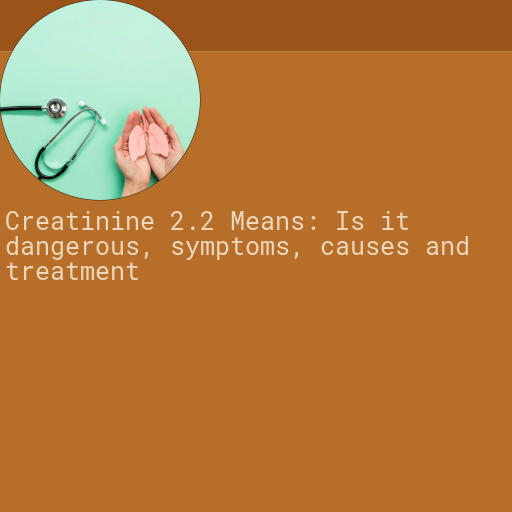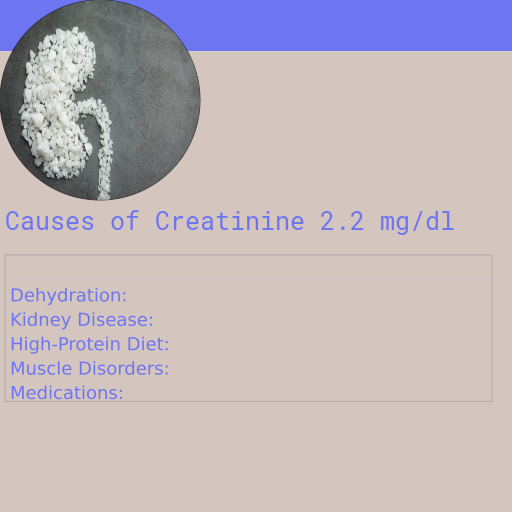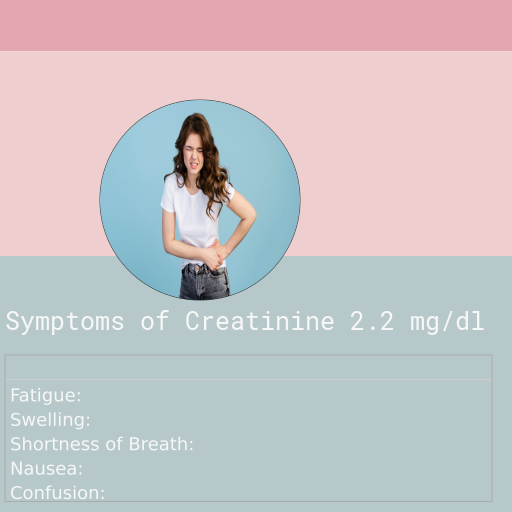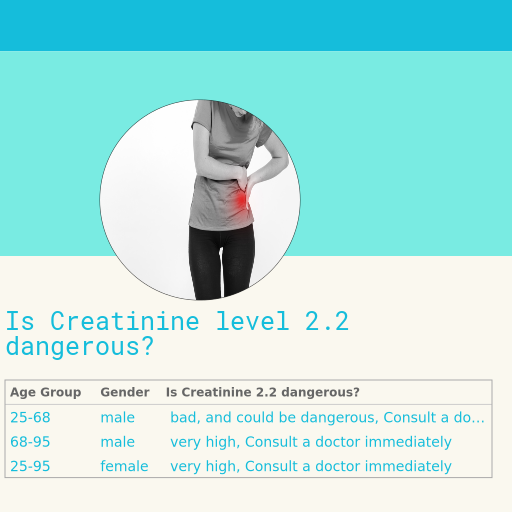Creatinine 2.2 : Is it Dangerous, Causes, Symptoms and More
When it comes to understanding kidney health, one critical marker often discussed is creatinine levels in the blood. Elevated creatinine levels can be a red flag, indicating potential kidney dysfunction. This blog aims to shed light on what a creatinine level of 2.2 means, exploring whether it is dangerous, and delving into the possible causes, symptoms, and treatment options associated with high creatinine. By gaining a comprehensive understanding of these aspects, you can better navigate concerns related to kidney health and take informed steps towards maintaining overall well-being.

What is Creatinine
Creatinine is a byproduct of protein breakdown that is generated by muscle metabolism and is typically filtered out by the kidneys. As a waste product, creatinine serves no useful function in the body and is excreted in the urine. Elevated levels of creatinine in the blood can indicate that the kidneys are not functioning properly, making it important to monitor this value in order to assess kidney health.
- Meat consumption: Eating red meat or other cooked meats can increase creatinine levels as they are rich sources of creatine, which converts to creatinine.
- Muscle mass: Individuals with greater muscle mass tend to have higher creatinine levels since creatinine is a byproduct of muscle metabolism.
- Exercise: Vigorous physical activity can lead to temporary increases in creatinine due to muscle breakdown and increased production of creatinine.
- Kidney function: Reduced kidney function can cause higher creatinine levels as the kidneys are responsible for filtering creatinine from the blood.
- Medications: Certain drugs, like nonsteroidal anti-inflammatory drugs (NSAIDs) and some antibiotics, can affect kidney function and subsequently elevate creatinine levels.
- Dehydration: Lack of sufficient fluids can concentrate creatinine in the blood, leading to higher levels.
- Dietary supplements: Supplements containing creatine, often used to enhance athletic performance, can increase creatinine levels in the body.
- Chronic diseases: Conditions like diabetes and high blood pressure can impair kidney function, resulting in elevated creatinine levels.
Normal Range of Creatinine in Adults
The normal range of creatinine levels in adults can vary slightly depending on factors such as age, sex, and muscle mass. However, for most adults, the standard reference range typically falls between 0.6 to 1.2 milligrams per deciliter (mg/dL) for men and 0.5 to 1.1 mg/dL for women. Elevated creatinine levels may indicate impaired kidney function or other medical conditions, making it essential to monitor and understand these values in the context of overall health.
| Age Group | Normal Creatinine Range (mg/dL) |
|---|---|
| 0 - 1 year | 0.2 - 0.9 |
| 1 - 3 years | 0.3 - 0.7 |
| 3 - 5 years | 0.3 - 0.8 |
| 5 - 10 years | 0.5 - 0.9 |
| 10 - 15 years | 0.5 - 1.0 |
| Adults (Men) | 0.6 - 1.2 |
| Adults (Women) | 0.5 - 1.1 |
| Older Adults | 0.6 - 1.3 |
Causes of Creatinine 2.2
Elevated creatinine levels can be a cause for concern as they may indicate underlying health issues. There are several factors that can lead to an increase in creatinine levels. Kidney dysfunction is one of the primary causes, as the kidneys are responsible for filtering creatinine from the blood. Conditions such as chronic kidney disease, glomerulonephritis, and acute kidney injury can impair kidney function, leading to elevated creatinine. Other causes can include dehydration, which reduces blood flow to the kidneys, and certain medications that can affect kidney function. Additionally, high-protein diets and intense physical activity can also temporarily raise creatinine levels. Understanding these causes is crucial for identifying the appropriate treatment and management of elevated creatinine.
- Dehydration: Insufficient fluid intake can lead to increased creatinine levels.
- Kidney Disease: Chronic kidney disease or acute kidney injury can impair creatinine clearance.
- High-Protein Diet: Consuming a diet rich in protein can temporarily elevate creatinine levels.
- Muscle Disorders: Conditions like rhabdomyolysis cause muscle breakdown, releasing creatinine into the blood.
- Medications: Certain drugs, including some antibiotics and NSAIDs, can affect kidney function and increase creatinine.
- Severe Infection: Infections that cause significant illness can stress the kidneys, leading to higher creatinine levels.
- Obstruction: Blockages in the urinary tract, such as kidney stones, can prevent creatinine from being excreted.
- Heart Failure: Reduced blood flow to the kidneys due to heart failure can cause elevated creatinine levels.

Symptoms of Creatinine 2.2
When creatinine levels rise, it can be indicative of underlying health issues that require immediate attention. Elevated creatinine often presents with a variety of symptoms, which can serve as warning signs. Common symptoms include fatigue, swelling (particularly in the legs and ankles), shortness of breath, and confusion. Recognizing these symptoms early can be crucial in diagnosing and managing potential kidney problems or other related health conditions.
- Fatigue: Elevated creatinine levels can cause a constant feeling of tiredness and lack of energy.
- Swelling: Fluid retention, particularly in the ankles, feet, and hands, is a common symptom.
- Shortness of Breath: Difficulty breathing may occur due to fluid buildup in the lungs.
- Nausea: Feeling queasy or the urge to vomit can be a sign of high creatinine levels.
- Confusion: Elevated creatinine can affect mental clarity, causing confusion or difficulty concentrating.
- Changes in Urination: Noticeable differences in the frequency, color, or amount of urine passed.
- High Blood Pressure: Hypertension may develop as a result of kidney dysfunction.
- Chest Pain: Pain in the chest can occur due to fluid buildup around the heart.

Dangers of Creatinine 2.2
When discussing the topic of creatinine, it's important to note that while creatinine itself does not directly affect the body, elevated levels can be an indicator of underlying health issues. High creatinine levels are often a sign of kidney failure or other renal problems, which means the kidneys are not efficiently filtering waste products from the blood. This inefficiency can lead to the accumulation of other harmful substances like urea, which can cause various health complications. Understanding the implications of elevated creatinine is crucial for identifying and addressing potential kidney-related health issues early on.
- Kidneys: Elevated creatinine levels typically indicate impaired kidney function, leading to chronic kidney disease or acute kidney injury.
- Heart: High creatinine can increase the risk of cardiovascular problems, including hypertension and heart failure.
- Liver: Poor kidney function can result in complications like hepatic encephalopathy due to the build-up of toxins that the liver has to process.
- Lungs: Fluid retention from kidney dysfunction can cause pulmonary edema, leading to breathing difficulties.
- Muscles: Elevated creatinine may be a sign of muscle damage or conditions like rhabdomyolysis, where muscle tissues break down.
- Nervous System: Toxin accumulation due to high creatinine levels can lead to neurological issues, such as confusion or seizures.
- Digestive System: Gastrointestinal symptoms like nausea, vomiting, and loss of appetite can be caused by elevated creatinine levels.
- Blood: Impaired kidney function can lead to anemia due to reduced production of erythropoietin, a hormone essential for red blood cell production.
Home remedies for Creatinine 2.2
Disclaimer: It is crucial to understand that an elevation in creatinine levels cannot be effectively treated at home. High creatinine levels often indicate underlying health issues, such as kidney dysfunction, that require medical intervention. Basic supportive care, such as staying hydrated, following a balanced diet, and avoiding over-the-counter medications that can affect kidney function, may help support overall health but are not substitutes for professional treatment. Always consult a healthcare provider for a comprehensive diagnosis and appropriate treatment plan.
- Hydration: Ensure you drink plenty of water throughout the day to help your kidneys flush out toxins more effectively.
- Dietary Changes: Opt for a low-protein diet to reduce the burden on your kidneys. Focus on fresh fruits, vegetables, and whole grains.
- Monitor Blood Pressure: Keep your blood pressure in check as high blood pressure can further damage your kidneys. Use a home blood pressure monitor for regular tracking.
- Avoid Over-the-Counter Medications: Steer clear of non-prescription painkillers like NSAIDs, which can worsen kidney function.
- Regular Exercise: Incorporate moderate physical activity into your routine to improve overall health and kidney function, but avoid strenuous exercises that can stress the kidneys.
Treatment for Creatinine 2.2
When a creatinine level of 2.2 is detected, medical treatment by a doctor is essential to address potential underlying issues. The primary treatment goals include stabilizing kidney function, discontinuing any harmful medications, and treating any present infections. These steps are crucial in preventing further damage and ensuring the kidneys can continue to function effectively. By addressing these key areas, healthcare providers aim to manage and ideally improve kidney health, reducing the risk of more severe complications.
- Hydration: Increasing fluid intake can help flush out excess creatinine from the kidneys.
- Dietary Changes: Reducing the intake of protein, salt, and potassium can alleviate kidney strain and lower creatinine levels.
- Medications: Doctors may prescribe medications to manage underlying conditions like high blood pressure or diabetes that contribute to elevated creatinine levels.
- Dialysis: In severe cases, dialysis may be necessary to filter waste products from the blood, including creatinine.
- Lifestyle Modifications: Regular exercise, avoiding smoking, and limiting alcohol consumption can improve overall kidney health and help manage creatinine levels.
GFR with Creatinine of 2.2
When discussing kidney health, it's crucial to introduce the concept of Glomerular Filtration Rate (GFR), a measure that provides a more comprehensive view of kidney function compared to just looking at creatinine levels. While creatinine is a waste product filtered out by the kidneys, its levels in the blood can be influenced by various factors such as muscle mass, age, and gender. GFR, on the other hand, estimates the rate at which the kidneys filter blood, giving a clearer picture of how well the kidneys are working. Therefore, a GFR is often more relevant than the absolute value of creatinine because it accounts for individual differences and provides a more accurate assessment of kidney function.
| Grade | GFR (mL/min/1.73 m²) | Kidney Function | Description |
|---|---|---|---|
| G1 | > 90 | Normal or High | Kidney function is considered normal. No signs of kidney damage. |
| G2 | 60-89 | Mildly Decreased | Kidney function is slightly reduced. There may be mild kidney damage. |
| G3a | 45-59 | Mild to Moderate Decrease | Moderate reduction in kidney function. May need monitoring and lifestyle adjustments. |
| G3b | 30-44 | Moderate to Severe Decrease | Significant reduction in kidney function. More intensive monitoring and possibly medical treatment required. |
| G4 | 15-29 | Severely Decreased | Severe reduction in kidney function. Preparation for potential kidney failure and dialysis or transplant may be necessary. |
| G5 | < 15 | Kidney Failure | Kidney function is critically low. Requires dialysis or kidney transplant. |
What is my GFR for a creatinine of 2.2
| Age | Gender | GFR |
|---|---|---|
| 18 | male | 39.18 ml/m2 |
| 45 | male | 32.53 ml/m2 |
| 60 | male | 30.68 ml/m2 |
| 80 | male | 28.94 ml/m2 |
| 18 | female | 29.07 ml/m2 |
| 45 | female | 24.14 ml/m2 |
| 60 | female | 22.77 ml/m2 |
| 80 | female | 21.48 ml/m2 |
Table of danger posed by Creatinine 2.2 in male across different ages
| Age Group | Is Creatinne of 2.2 dangerous? |
|---|---|
| 25yrs - 68 yrs | bad, and could be dangerous, Consult a doctor |
| 68yrs - 95 yrs | very high, Consult a doctor immediately |
Table of danger posed by Creatinine 2.2 in female across different ages
| Age Group | Is Creatinne of 2.2 dangerous? |
|---|---|
| 25yrs - 95 yrs | very high, Consult a doctor immediately |

Which other tests should be done for a creatinine value of 2.2?
When evaluating kidney function and overall health, it’s crucial to consider other diagnostic tests alongside creatinine levels. Tests such as electrolytes, which measure minerals like sodium, potassium, and chloride, provide insight into your body’s fluid balance and electrical activity. A comprehensive renal profile can further assess kidney health by including measurements of blood urea nitrogen (BUN), glomerular filtration rate (GFR), and other essential markers. Additionally, blood gas levels can reveal issues with acid-base balance and oxygenation, which are vital for diagnosing and managing various health conditions. Together, these tests offer a more complete picture of your health, helping healthcare providers make informed decisions about your treatment plan.
- Electrolytes: This blood test measures the levels of essential minerals such as sodium, potassium, calcium, and magnesium. Abnormal levels can indicate kidney dysfunction, dehydration, or other metabolic issues.
- Renal Profile: A comprehensive renal profile includes a series of tests, such as blood urea nitrogen (BUN), creatinine, and glomerular filtration rate (GFR), to assess kidney function and detect potential renal disease.
- Blood Gas Levels: This test measures the amount of oxygen and carbon dioxide in the blood, providing insights into lung function and the body's acid-base balance. Abnormal blood gas levels can be indicative of respiratory or metabolic disorders.
- HbA1c: The HbA1c test measures the average blood sugar levels over the past three months. It's crucial for diagnosing and managing diabetes, which can have a significant impact on kidney health.
- Liver Enzymes: Tests for liver enzymes, such as AST and ALT, help assess liver function. Elevated levels can indicate liver damage or disease, which can be related to or affect kidney health.

 By: Dr.Bhargav Raut
By: Dr.Bhargav Raut